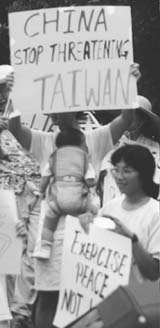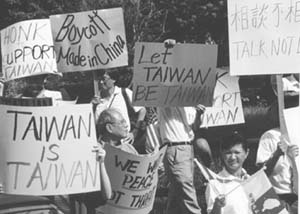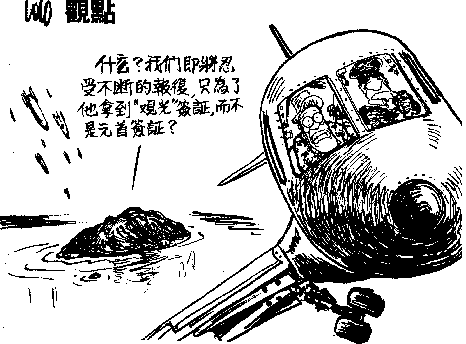 Taiwan
Communiqué No. 67, August 1995
Taiwan
Communiqué No. 67, August 1995 Taiwan
Communiqué No. 67, August 1995
Taiwan
Communiqué No. 67, August 1995Between 21 and 26 July 1995, the Chinese military fired a total of six missiles at an area only 80 miles to the North of Taiwan. Four of these were M-9 missiles with a range of 375 miles, while two were DF-21 missiles, with a range of more than 1,100 miles.

Taiwanese father and son protesting Chinese missiles
On August 15th, the Beijing authorities started a second series of military exercises in the same area, and fired missiles with life ammunition. On August 18th, the Chinese further increased the tension by detonating a nuclear device at their Lop Nor test site. The latest nuclear test was strongly protested by nations in the area, in particular Japan, Australia, and New Zealand. The United States and the European Nordic also expressed their deep concern.
These aggressive moves are clearly designed to intimidate the people and government of Taiwan, and to prevent them from moving further on the road towards a fully democratic and independent Taiwan, and gaining international diplomatic recognition for the island. The tension and instability caused by China's aggressive behavior prompted a broad discussion on how to deal with this issue. Some observers, and a number of governments, attempt to appease China. Others argue for the need to contain China, and say that in order to prevent much larger problems in the future, it is essential to take stronger measures which would convincingly make it clear to China that it should start to behave like a responsible member of the world community.
The menacing Chinese moves were accompanied by a barrage of slandering invectives by the Chinese government-controlled media such as the Xinhua News Agency against President Lee Teng-hui and against the island's movement towards international recognition.
The Chinese bluff and bluster prompted a variety of responses from the Taiwanese side: in the article "Taiwan under pressure" (pp. 15), we present these in greater detail.
The Chinese missile tests also prompted widespread demonstrations by the Taiwanese communities in the United States and Canada: from July 26th through 28th and again on August 18th, hundreds of people demonstrated in front of the Chinese consulates in Los Angeles, Toronto, and Vancouver, and in front of the Chinese embassy in Washington DC.
The demonstrations carried placards against the Chinese missile tests, "hands off Taiwan", "Taiwan is Taiwan, China is China", "Boycott made in China" and many more. They also carried home-built replicas of "Taiwan Patriot" defense missiles. In the US Congress, suggestions have been made that, if the Chinese threat continues, the US should make the Patriot missile or its successor available to Taiwan.
On 10 August 1995, the Taiwan Democratic Progressive Party mission in the U.S. issued a strong statement in protest against the missile tests. The full text follows below:
Chinese artillery and missile tests threaten Asian security DPP urges the US to respond according to the Taiwan Relations Act
|
It was not only the firing of missiles against Taiwan, which demonstrated China's unruly behavior. Also on a host of other issues, the Chinese authorities are flagrantly disregarding international standards of responsible behavior:

Taiwanese in Washington protest Chinese missile tests, and urge boycott of Chinese products
Taiwan Communiqué comment: This all adds up to a bleak picture. The Chinese authorities are developing, testing, and exporting weapons of mass destruction , trying to expand their territory at the expense of smaller neighbors, blatantly disregarding human rights, political rights, freedom of expression, and -- in the case of Taiwan -- the freedom to chart the future of Taiwan as a democratic and independent nation.
What the West and the Asian nations surrounding China should do is firmly stand up to China. Failing to do this at this initial stage will invite more unruly behavior, eventually leading to a real catastrophe in East Asia.
The hardening of relations between China and its East Asian neighbors and the Western world prompted a broad discussion on how to deal with this issue. Some observers, and a number of governments, favor a policy of appeasing China , saying: don't "rock the boat," as this might provoke China.
Prominent among these is former Secretary of State Henry Kissinger, who has become the Beijing regime's most ardent apologist. In an article titled "Heading for Collision in Asia" (Washington Post, 26 July 1995) Mr. Kissinger seemed to condone the Chinese aggressive behavior, and downplayed or totally neglected the issues on which China was acting irresponsibly.
Another person favoring appeasement with the Chinese is Mr. Walter Russell Mead ("The danger of bigger trouble with the Chinese", New York Times, 15 August 1995). In his article, Mr. Russell Mead makes it appear as if the problems are primarily due to "American hostility towards the Chinese." He thus overlooks that the US has actually bent over backwards to accommodate the Chinese, and that it is China that is threatening, bullying, and overreacting.
Other observers favor taking a more forceful line, and say that in order to prevent much larger problems in the future, it is essential to take a strong position against China, which would convincingly make it clear to China that it should start to behave like a responsible member of the world community.

President Lee: "All these missiles just because I got a tourist visa to Cornell? What would have happened if I had gone as head of state?"
This school argues in favor of drawing clear and distinct positions, and making it clear to China that if it crosses a particular line on any of the issues involved, there will be consequences. Most prominent among these is Mr. James Lilley, former US ambassador to China. Mr. Lilley argues that the downswing in relations started long before Mr. Lee's visit, and is being aggravated by both the power struggle in Beijing and by mishandling of the situation by the US Department of State: for far too long it cast its feet in concrete by saying that President Lee would not be issued a visa. Even three days before the approval by president Clinton, the Department still issued a statement that the answer was negative.
Another influential person arguing for a tougher line is Mr. Gerald Segal of the London-based International Institute for Strategic Studies. In an article, titled "We can shape China as a Congenial Superpower" (Los Angeles Times, 7 August 1995) Mr. Segal says that a serious debate is necessary on how to handle the rise of China. He states: "Tying China into the international system has elements of both "containment" and "engagement," and it is not worth feigning that we cannot use either term in our debates."
A third voice in favor of a stronger position by the US and Western Europe is The Economist of London. In an editorial in its 29 July 1995 issue, the British publication states "...as China tests missiles off the coast of Taiwan and speaks of a possible invasion, it is becoming harder to pretend that it is not, potentially, a source of huge instability. ..... It is right to try to engage China, but it is also right to make it much plainer that China has no license to threaten its neighbors .... Economic engagement and strategic containment should be part of a coherent whole."
On the issue of Taiwan, The Economist states: "...the best way to minimize (the possibility of a Chinese invasion) is not to appease China by cutting Taiwan off from the international society. That would be to concede China's basic contention that whatever happens between China and Taiwan is an internal Chinese affair, and thus to concede its justification for an invasion of its island neighbor ..... The best policy is gradually to expand ties with Taiwan, as America is already doing. China should be left in no doubt that an invasion of Taiwan -- the United States's sixth largest trading partner -- would comprehensively wreck relations with capitalist Asia and the West, far more than the killings of the pro-democracy demonstrations in Beijing in 1989 ever did."
Also an advocate of a tougher line is Mr. Jim Hoagland, who wrote: "China adroitly manipulated a straw man argument to bully the United States into .. studied silence. By accusing Washington of trying to "contain China," Beijing tries to paint even moderate criticism of or differences with China as warlike acts which must be avoided" ("Why does America bash Japan and coddle China ?", International Herald Tribune, 10 August 1995). Mr. Hoagland also argues in favor of de-linking the Taiwan debate from China: "Just as Russia must not be given a veto over America's relations with the new democracies of Eastern Europe and the Ukraine, Beijing cannot be given power to determine how Washington conducts itself vis-á-vis Taiwan. U.S.-Taiwan relations cannot be held hostage to the paranoid, lurid fantasies of the gerontocracy that rules in Beijing."
Last, but not least, we refer to the article which ruffled most feathers in Beijing: Charles Krauthammer's "Why we must contain China" (TIME Magazine, 31 July 1995). Mr. Krauthammer titillates Messrs. Winston Lord and Newt Gingrich for their diplomatic fibbing, and states that "...any rational policy towards a rising, threatening China would have exactly these two components: 1) containing China as it tries relentlessly to expand its reach, and 2) undermining its pseudo-Marxist but still ruthless dictatorship.
Back to: Table of Contents
Copyright © 1995 Taiwan Communiqué